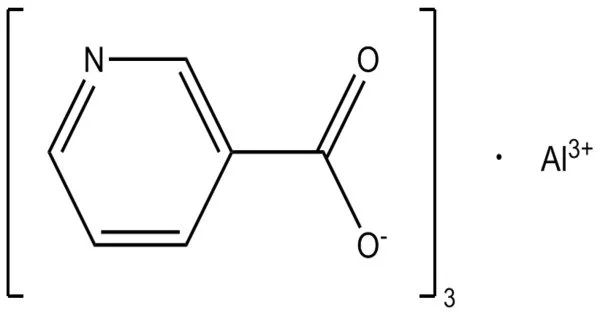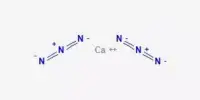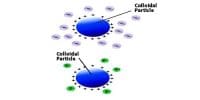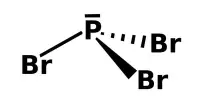Aluminium nicotinate is a chemical compound that consists of aluminium and nicotinic acid, also known as niacin or vitamin B3. It is a niacin derivative used as a hypolipidemic agent. It has the chemical formula Al(C6H4NO2)3 and is a coordination complex in which the aluminium ion is coordinated to three molecules of nicotinate.
Aluminum nicotinate is used in dietary supplements as a source of niacin and aluminum. It may help improve blood flow, reduce inflammation, and support healthy skin, among other potential benefits. It is generally considered safe when used in recommended amounts. However, excessive intake of aluminum can be toxic and may cause health problems, especially in people with kidney disease.
Properties
Aluminum nicotinate, also known as aluminum niacin, is a chemical compound that is a combination of aluminum and niacin (vitamin B3). Here are some of its properties:
- Chemical formula: Al(C6H4NO2)3
- Molecular weight: 415.23 g/mol
- Appearance: White powder
- Solubility: Soluble in water, slightly soluble in alcohol
- Stability: Stable under normal conditions of use and storage.
Application
Aluminium nicotinate has been studied for its potential therapeutic applications, particularly as an anti-inflammatory and antioxidant agent. It has been suggested that it may be useful in treating conditions such as Alzheimer’s disease, Parkinson’s disease, and multiple sclerosis.
Aluminium nicotinate has been investigated for its potential therapeutic applications in various medical conditions, including osteoporosis, Alzheimer’s disease, and Parkinson’s disease. However, its effectiveness and safety are still under investigation, and further research is needed to determine its potential benefits and risks.
Safety
It is important to note that excessive intake of aluminium can have harmful effects on the human body, particularly on the nervous system, so caution should be taken when using aluminium-containing compounds as supplements or medications. It is important to note that aluminum nicotinate should only be used under the guidance of a healthcare professional, as its safety and effectiveness may vary depending on the individual’s health status and other factors.
However, there is limited research on the safety and effectiveness of aluminium nicotinate in humans, and some concerns have been raised about the potential toxicity of aluminium in the body. Therefore, more research is needed before aluminium nicotinate can be recommended as a treatment for any specific condition.
















